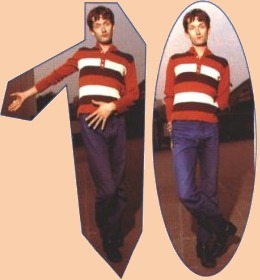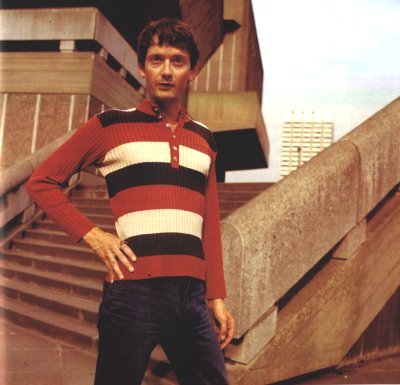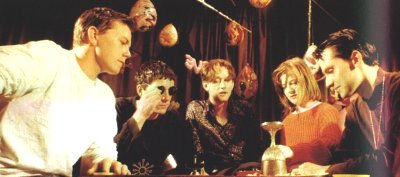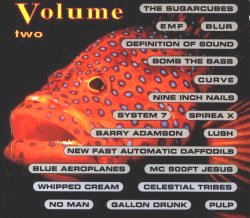Words: Paul Mathur, Photographer: Alastair Indge
Taken from Volume Two, November 1991
In the early '80s, a deeply disturbed
Sheffield pop group called Pulp crafted a brace of lovably awkward
pop classics, most notably the 'controversial' 'Little Girl (With
Blue Eyes)'. Their singer Jarvis Cocker also fell out of a window
while trying to impress a girlfriend - as you do - and continued
to use his wheelchair as a stage prop long after he'd regained the
use of his legs.
These days the group members are distributed between Sheffield,
Manchester and London (where Jarvis has been a film student).
Undaunted, they've returned to make their third album, aptly titled
'Separations', and a newly revitalised desire to be the most famous
people in the world. No one knows what happened to the wheelchair.
Jarvis Cocker wants the songs to speak for themselves. He'd rather
talk about space.
"I think space is something that a lot of people our age are
fascinated with. I'm not a sci-fi buff or anything, don't get me
wrong. It's just that I remember when I was young watching the first
man on the moon. We were allowed to stay up late. And at the same time
there were all these Space Annuals and Star Trek on the telly.
I suppose it all sort of blurred together, so you weren't sure what
was real and what was fantasy. The people at NASA were saying that by
1984 or something, we'd all be living on different planets or whirring
around in Space Stations, and we believed them completely. There
didn't seem to be any reason why we wouldn't."
"All that happened when I was young affected my life and the way that
I grew up. It's like, just the other week I finally got a bike. I
never got a bike when I was young because I was thinking to myself,
I'm not going to need one in a few years. I was convinced that I'd be
whizzing down the shops with my personal jetpack. I didn't think you'd
need a bike if you were living on the moon. It would float away."
"I suppose I finally realised that it was all a fantasy when I was
22. I didn't have any money and there wasn't much coming in from the
band so I was selling off my belongings. I distinctively remember
tromping around Sheffield with a yellow portable washing machine,
trying to sell it to get the money for some food. It was pissing down
and I thought to myself, Jarvis, you were supposed to be living in
space by now. It was pretty obvious by then that it wasn't going to
happen. You have to stop living your life for the future."
"I wrote this song on the new LP about how you leave school and you
treat the rest of your life like a big countdown for something big
that's going to happen - and the years go by with you thinking, well,
when am I going to get to the 10, 9, 8, 7, 6 bit? It just never comes
along."
 "The thing about all that space stuff is that it was a complete
fantasy on TV. Everyone in Star Trek was so clean and healthy.
No one ever farted or had beer bellies. If people end up going to
Mars, they're going to have to do something about the smell of all the
farts. And lots of space travel gives you really brittle bones as
well. If you spent all those years in space, going to Mars and back,
when you got to earth you'd probably crumble. That wouldn't be much
good would it?"
"The thing about all that space stuff is that it was a complete
fantasy on TV. Everyone in Star Trek was so clean and healthy.
No one ever farted or had beer bellies. If people end up going to
Mars, they're going to have to do something about the smell of all the
farts. And lots of space travel gives you really brittle bones as
well. If you spent all those years in space, going to Mars and back,
when you got to earth you'd probably crumble. That wouldn't be much
good would it?"
"The first British woman in space was from Sheffield you know. I think
it sent her a bit weird though, because when she got back she was the
guest of honour at the World Student games which Sheffield was
hosting. They'd brought the Olympic flame all the way from Japan or
somewhere and she had to run with it for the last 100 yards along a
red carpet. Anyway, she got hold of it, ran for a bit, then fell over
and it went out. They still lit the big flame though, but only for 10
minutes at the beginning and the end, because British Gas wouldn't
sponsor it all. That's the sort of thing that happened in Sheffield."
"I'd still like to believe that one day we'll all be able to go to
space and live there. I see that John Denver tried to get out on one
of the shuttles. Can you imaging being stuck in a rocket with him
while he played 'Annie's Song' over and over again? I reckon they
should get Pulp to go along with them. We'd write songs like 'Space
Station Blues'. They'd love us. If they're going to colonise other
planets they're going to need entertainers, not just scientists and
things."
"I don't think I'm really fit enough to get invited as things stand
at the moment. I haven't had any trouble with the legs recently though
- even though the doctor, who was a bit of a miserable bastard, told
me I'd probably have to have bone replacement and never be able to
move my feet again. Space makes people go a bit strange I think. The
sixth man on the moon, who obviously doesn't get remembered very much,
was a bloke called Ed Mitchell. He claimed that when he was standing
on the moon, he sent out all these telepathic thoughts that people on
earth were supposed to be able to pick up. I didn't get anything
coming through myself though."
 "The thing about all that space stuff is that it was a complete
fantasy on TV. Everyone in Star Trek was so clean and healthy.
No one ever farted or had beer bellies. If people end up going to
Mars, they're going to have to do something about the smell of all the
farts. And lots of space travel gives you really brittle bones as
well. If you spent all those years in space, going to Mars and back,
when you got to earth you'd probably crumble. That wouldn't be much
good would it?"
"The thing about all that space stuff is that it was a complete
fantasy on TV. Everyone in Star Trek was so clean and healthy.
No one ever farted or had beer bellies. If people end up going to
Mars, they're going to have to do something about the smell of all the
farts. And lots of space travel gives you really brittle bones as
well. If you spent all those years in space, going to Mars and back,
when you got to earth you'd probably crumble. That wouldn't be much
good would it?" Volume interview with Jarvis Cocker
Volume interview with Jarvis Cocker
